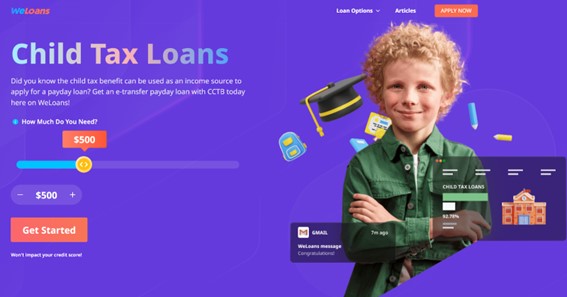Introduction
In the majority of Canadian provinces, child tax loans are a relatively new type of loan, generally centered on obtaining loans linked to Canadian child tax benefits (CCTB or CCB). The idea behind this loan is to provide loans to qualified participants who receive Canadian child tax benefits in an effort to lessen the impact of unanticipated expenses.
Being approved for a loan can be difficult, especially for traditional loans, which often need strong regulatory requirements, good credit scores, and evidence of reliable sources of income. Due to the fact that most loans are made in accordance with the loan approval procedures of established financial organizations like banks, not even loan brokers are exempt.
Thankfully, WeLoans, a website that facilitates online loans, provides child tax loans in addition to a wide range of other lending products like installment loans, payday loans, and even jobless loans.
The Benefits of Child Tax Loans: More Than Just Financial Assistance
Child tax loans, as mentioned earlier in this article, are rapid loans given by loan brokers to families who receive funds from the Canada Child Tax Benefit (CCTB or CCB). These monies are frequently accessible to households with minor children who meet specific requirements.
The idea behind child tax loans is to provide quick cash for unforeseen costs that will be repaid when the beneficiary family receives their child tax benefits. The loan of child tax is comparable to the jobless loan that WeLoans also provides in many aspects.
Since they are receivers of the CCTB, which is paid by the government at regular intervals, prospective loanees do not need to authenticate their sources of income or work status, in contrast to typical loan kinds.
How to Apply for Child Tax Loans?
Step 1: Visit the WeLoans website with accurate information on the application for a child tax loan.
Step 2: Evaluate lenders’ offers in light of the strength of your application. You are more likely to get more offers the more strong your application is.
Step 3: Accept an offer and wait for the loan to be disbursed to the designated account.
There are also many different loan options on the homepage of WeLoans. Check here you can find more different loans at WeLoans.
Prospective loan applicants should confirm their eligibility no matter which loans they want to apply for from WeLoans. The following criteria must be met to be eligible for a WeLoans child tax loan.
Credit score checks: In order to assure a specific level of financial responsibility, partner lenders will most likely examine the credit scores of applicants for a child tax loan. While having a bad credit score may not rule a potential borrower out, it will certainly reduce the number of viable offers for them.
Financial History: Similar to credit score checks, the majority of lenders are ready to lend to applicants who have never declared bankruptcy. Again, this does not imply that those who have declared bankruptcy are prohibited from applying for a child tax loan. It simply indicates that it will be more challenging for these borrowers to receive competitive offers from lenders.
A CCTB Recipient: The principle of this kind of loan is predicated in large part on the ability of the loanee to repay the loan with money obtained from CCTB or CCB funding. This implies that the beneficiary must demonstrate their eligibility for the Canada child tax benefit program in order to be eligible for child loans from WeLoans.
Age Requirements: All prospective borrowers must be at least 18 years old at the time of application for the loan, as is the case with the majority of loans given by WeLoans and other loan brokers in Canada.
Canadian Resident: In order to be eligible for the child tax loan, potential candidates must be citizens of Canada. They must also demonstrate their residency by submitting a utility bill or another recognized form of identification.
Functional Bank Account: Access to the WeLoans child tax loan is also contingent upon having a functional bank account. When an application has been submitted and an offer has been approved, this is necessary for loan distribution.
Depending on the type of child tax loan offered, WeLoans offers a range of loan amounts. In this case, applicants seeking installment loans may receive up to $15,000 with a 60-month repayment schedule.
Payday loans, in contrast, have a $1,500 maximum loan amount, a 62-day maximum repayment period, and set interest rates that range from $14 to $25 for every $100 borrowed.
What are the Key Considerations When Comparing Child Tax Loans?
The entire purpose of asking for loans is to alleviate specific financial difficulties, which implies that safety measures must be implemented to prevent a debt cycle or a rejected loan application. The following elements should be taken into account when contrasting Child Tax Loans from various loan brokers.
Funds availability: Because child tax loans are intended to be used for emergency situations, this is a crucial consideration when applying for one.
Checking the financing expenses: Checking the expenses of several trustworthy Child Tax Loan providers is encouraged because these fees, which include interest rates and penalties for late payments, can have more severe financial repercussions if not carefully considered.
Conclusion
Thanks to WeLoans among other industry-leading loan brokers, child tax loans have become an effective tool with which prospective loanees can access credit facilities to solve immediate needs with considerable financial implications.
Prospective loanees who meet eligibility standards do not have to depend solely on employment-based income to receive financial aid, especially in dire situations. Based on their current verifiable income levels, people with bad credit are also not excluded and can also receive urgent financial assistance.
WeLoans promises to create a more inviting financial climate for everyone, but it’s crucial to keep in mind that borrowing should only be done when it is truly necessary and responsibly applied for. Even today, being financially responsible is essential, especially for those with bad credit.

